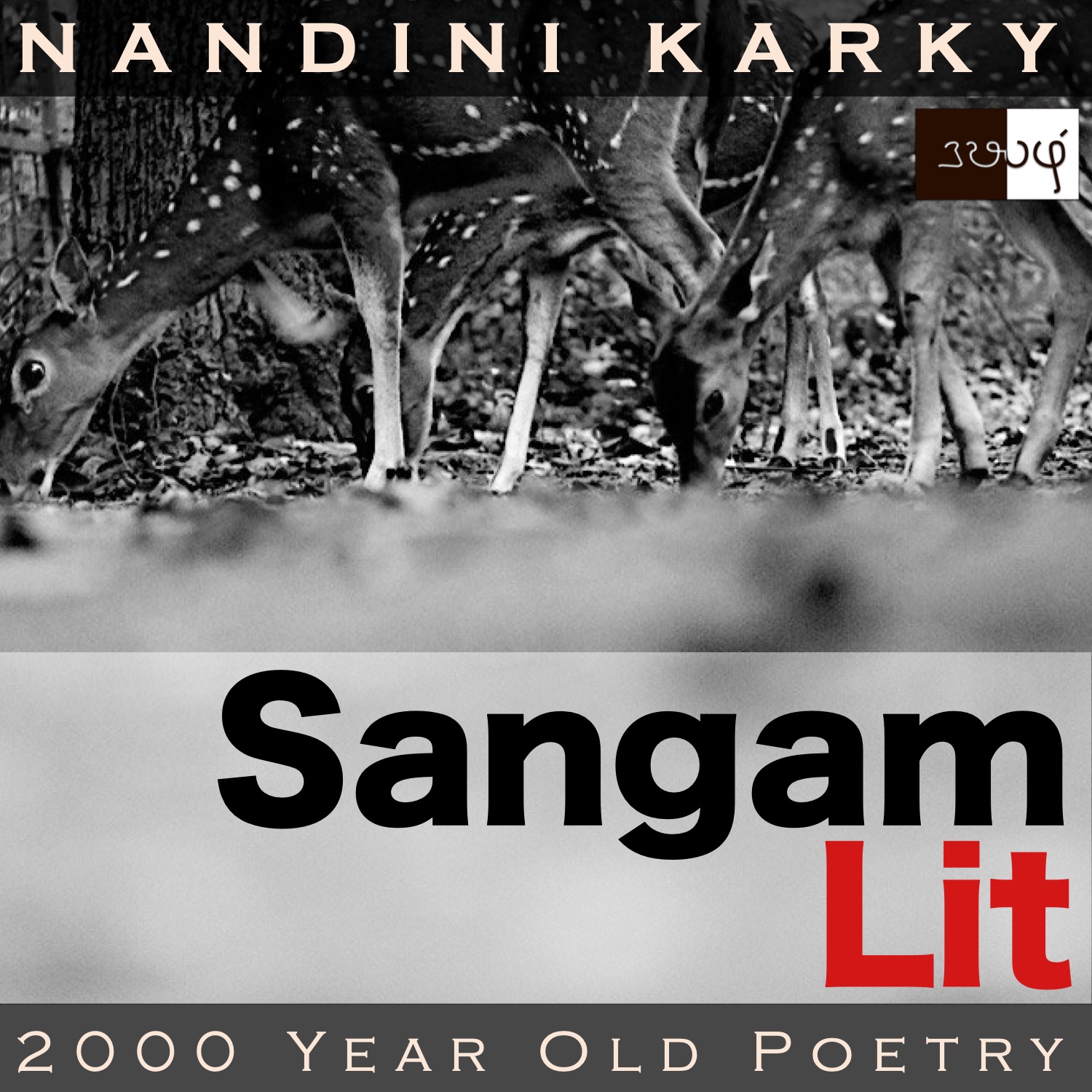Podcast: Play in new window | Download
Subscribe: Apple Podcasts | Spotify | Amazon Music | Android | iHeartRadio | TuneIn | RSS | More

In this episode, we reflect on the conflict between ambition and affection portrayed in Sangam Literary work, Natrinai 84, penned by an anonymous poet. Set in the ‘Paalai’ landscape of drylands, the poem speaks in the inconsolable voice of the lady to her confidante, expressing her angst at her man’s parting away.
கண்ணும், தோளும், தண் நறுங்கதுப்பும்,
திதலை அல்குலும் பல பாராட்டி,
நெருநலும் இவணர் மன்னே! இன்றே,
பெரு நீர் ஒப்பின் பேஎய் வெண் தேர்
மரன் இல் நீள் இடை மான் நசையுறூஉம்,
சுடுமண் தசும்பின் மத்தம் தின்ற
பிறவா வெண்ணெய் உருப்பு இடந்தன்ன
உவர் எழு களரி ஓமை அம் காட்டு,
வெயில் வீற்றிருந்த வெம்பு அலை அருஞ் சுரம்
ஏகுவர் என்ப, தாமே-தம்வயின்
இரந்தோர் மாற்றல் ஆற்றா
இல்லின் வாழ்க்கை வல்லாதோரே.
The poem begins by listing organs proclaiming the physical well-being of a woman, talking about her ‘கண்’ meaning ‘eyes’, ‘தோள்’ meaning ‘shoulders’ and ‘கதுப்பு’ meaning ‘hair’. Remarkable that the word for ‘praise’ remains ‘பாராட்டி’ over the many millennia! We meet again the beautiful word for ‘yesterday’ in ‘நெருநல்’! Learnt a fascinating expression for the word ‘mirage’ in ‘பேஎய் வெண் தேர்’, which literally translates to ‘devil’s white chariot’. What a poetic expression for that which deludes human perception! ‘சுடுமண் தசும்பு’ details the art of pottery by referring to a ‘fire-baked clay pot’. Got to know that the word ‘களரி’ does not refer to the popular martial art form but to ‘saline soil’. Let’s take a moment to praise the ingenuity of those poets of yesterday in packing together perception, pottery, physics and physiography in a few lines of verse.
Moving into the meaning of the verse, we find that the man and woman have been in a blissful married life. During such a time, the man parts away from the lady, going in search of wealth. The lady is filled with anguish and she turns to her confidante saying, “Just yesterday, he was here, showering praises many on my eyes, my shoulders, my fragrant, cool hair and my yellow-streaked loins. But today, he’s far away. The mirage deludes in that treeless, long path, making deer come near it with desire, seeming like a big body of water. Like butter that doesn’t gather together and lies scattered even as the rod churns on the hot clay pot, the saline soil lies scattered in that dryland forest with just the ‘omai’ trees. In that place, heat rules with severity and a wave of harshness spreads all across the land. They say that he’s by himself, walking on such a dreary path. All because he is incapable of living a life at home refusing to render help to those who come to him, seeking.” With these words, the lady puts forth the honourable reasons for the man’s parting away and yet, reveals that she’s filled with pain!
Delving into the layers of the poem, we find an elaborate description for a mirage. As mentioned before, this is referred to as a ‘devil’s chariot’ in this poem. When riding our own metal chariots on highways on a hot day, we may have experienced this phenomenon of puddles appearing ahead on the road before us. I read that this happens because of the refraction of light waves when there’s a hot layer of air below cooler layers of air. This is mostly prevalent when the temperatures soar and same here, says the poem with its description of the place as one where heat reigns supreme! Such a mirage is said to be mistaken for a pond of water by thirsty deer roaming the dry forest. Not a mere a description of the natural scene but a metaphor to say how all the praise and love from the man yesterday, seems to have turned into a mere mirage today, by his parting away. Another stunning simile smiles at us in the comparison between scattered butter in the churning pot and the scattered saline soil of the land, that does not let plants bloom. Searching on the web, I find many articles on agriculture discussing the saline soil prevalent in Tamilnadu and ways to solve it. A concern that has been around for quite some time, as detailed further by the poem which mentions that the only tree that grows here is the ‘Omai’ tree or the ‘toothbrush tree’, which we have met before in its alias of ‘Ukai’ tree. The tree being short and having tiny leaves offers no shade to the man walking alone on this harsh path.
As the lady imagines the man suffering on this path, she also understands he is going through all this, not for any selfish gain but for a noble purpose. He wants to earn that wealth so as to be able to shower on those who come to him in need. The lady declares that the man is not someone who can bear to say ‘no’ to the needy. Thus, she understands why the man had to leave and yet, she’s desolate. A testimony to the fact that the heart’s eyes are clouded by the mirage of emotion to raise above and fully perceive the logic of the mind’s path!




Images in this poem reminds me of the movie ‘Mariyan’. Desert, suffering and ‘Netru Aval Irunthal’ song 😊